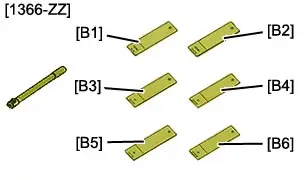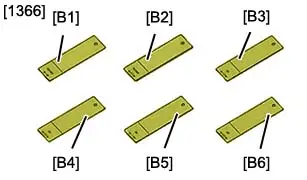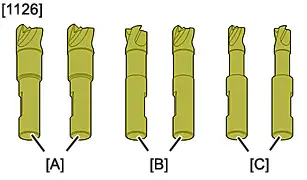Peugeot 308: Replacement : Roof crossmembers
ESSENTIAL : Before any operation on the structure of a vehicle fitted with a traction battery, the vehicle must be disconnected electrical supply.
ESSENTIAL : Observe the safety and cleanliness recommendations
 .
.
ESSENTIAL : Observe the precautions to be taken for the pyrotechnic components
 .
.
ESSENTIAL : All personnel carrying out work on a vehicle fitted with traction batteries must have received specific electric vehicle training and be authorised to work on these vehicles (observe the regulations in force in the respective country).
CAUTION : All of the stripped surfaces must be protected by means of the approved electrolytic rezincing process .
CAUTION : The number of spot welds or weld beads required for assembling a new component must be identical to the number of spot welds or weld beads attaching the original component.
1. Information
Types of spot welds or beads using the electric arc process :
- MIG braze welding with cupro-aluminium filler used with an inert gas
- MAG welding with steel filler metal and active gas
Designation of the high strength panels :
- High strength (HSS) : High strength steel
- Very high strength (VHSS) : Very high strength steel
- Ultra high strength (UHSS) : Ultra high strength steel
N.B. : Use the products recommended by the manufacturer
 .
.
N.B. : The roof crossmembers can be changed independently of one another.
2. Tooling
Workshop equipment :
- Swan’s neck drill for cutting out electric spot welds
- Hot air blower
| Tool | Reference | Description |
| [1366-ZZ] | Toolkit for testing electric spot welds |
| [1366] | Samples for testing electric spot welds |
| [1126] | Set of drill bits for removing spot welds |
3. Preliminary operations
ESSENTIAL : Deactivate the pyrotechnic systems
 .
.
CAUTION : Perform the operations that are required prior to a disconnection of the ancillaries battery
 .
.
CAUTION : In the case of a vehicle with 2 batteries, carry out the specific operations for disconnecting and reconnecting the ancillaries batteries.
Disconnect the ancillaries battery or batteries.
CAUTION : Either remove or protect those components which are in the repair zone and risk being damaged by the heat or the dust.
Remove :
- The windscreen
- The tailgate
- The headlining
- The interior trims
Release the electrical harnesses.
Replace the roof.
4. Location of the replacement part
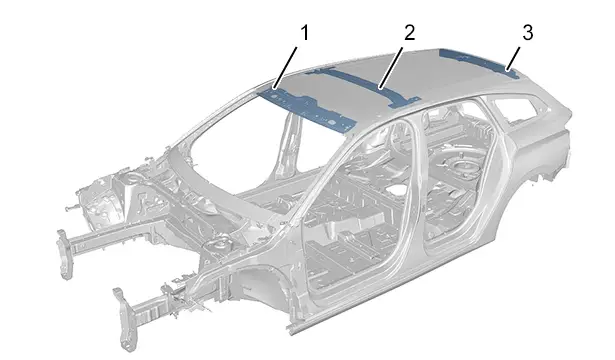
| Identification | Description |
| (1) | Roof front crossmember |
| (2) | Roof central bow assembly |
| (3) | Assembled rear roof cross member |
5. Identification of replacement parts
5.1. Composition : Roof crossmembers
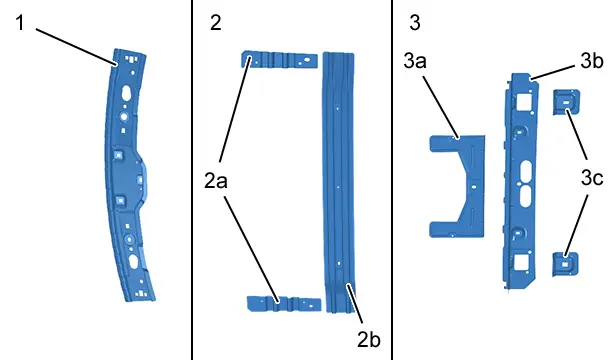
| Identification | Description | Thickness | Nature/classification |
| (1) | Roof front crossmember | 0,90 mm | Mild steel |
| (2) | Roof central bow assembly | - | - |
| (2a) | Roof central bow gusset | 1,05 mm | High strength (HSS) |
| (2b) | Central roof bow | 1,10 mm | Very high strength (VHSS) |
| (3) | Assembled rear roof cross member | - | - |
| (3a) | Roof stiffener | 0,75 mm | Mild steel |
| (3b) | Roof rear crossmember | 0,77 mm | High strength (HSS) |
| (3c) | Rear tailgate hinge strengthener | 1,45 mm | High strength (HSS) |
5.2. Identification of the parts adjacent to the replacement part
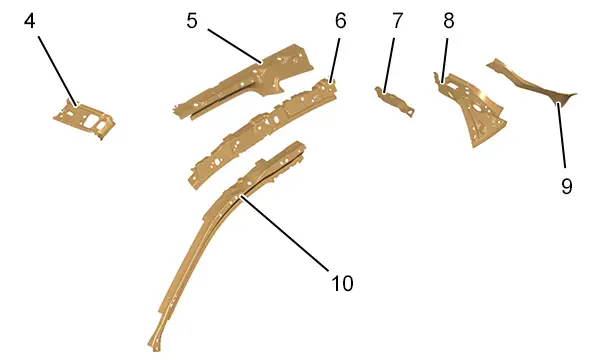
| Identification | Description | Thickness | Nature/classification |
| (4) | Roof front crossmember bracket | 1,45 mm | Very high strength (VHSS) |
| (5) | Roof bow strengthener | 1,10 mm | Ultra high strength (UHSS) |
| (6) | Windscreen pillar inner panel | 1,30 mm | Ultra high strength (UHSS) |
| (7) | Rear quarter panel inner panel upper strengthener | 0,65 mm | High strength (HSS) |
| (8) | Rear wing drip moulding gusset | 1,05 mm | Mild steel |
| (9) | Tailgate aperture drip moulding | 0,65 mm | Mild steel |
| (10) | Windscreen pillar strengthener | 1,10 mm | Ultra high strength (UHSS) |
CAUTION : Take into account the difference in thickness of the parts when adjusting the welding station.
6. Preparation of the replacement parts
CAUTION : When cleaning the mating edges, use scouring wheels only to avoid damaging the anticorrosion protection.
6.1. Preparation : Roof front crossmember
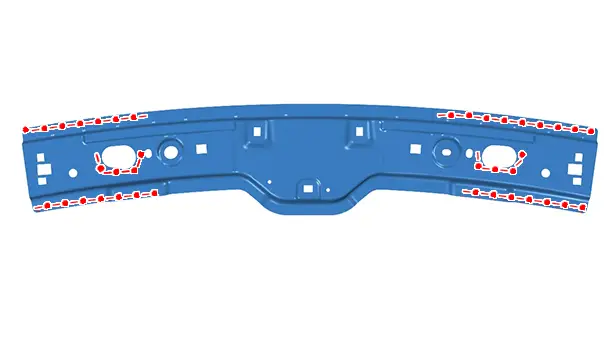
Prepare the mating edges and protect them using a weldable primer (index "C7").
N.B. : Apply the weldable primer on the internal faces of the panels to be welded.
6.2. Preparation : Roof central bow assembly
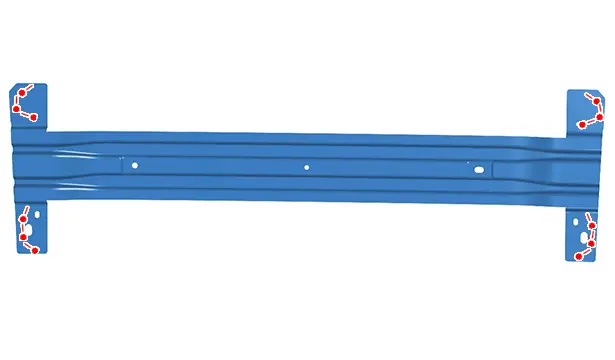
Prepare the mating edges and protect them using a weldable primer (index "C7").
N.B. : Apply the weldable primer on the internal faces of the panels to be welded.
6.3. Preparation : Assembled rear roof cross member
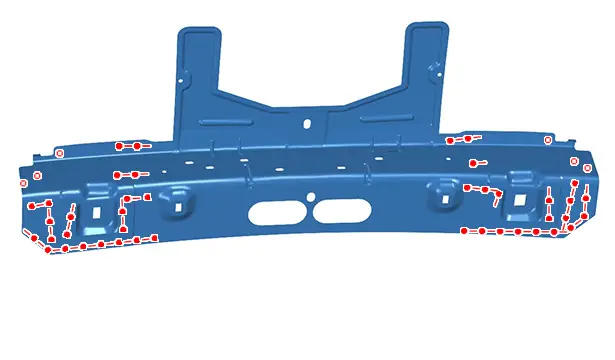
Mark then drill to a diameter of 7 mm for later plug welding.
Prepare the mating edges and protect them using a weldable primer (index "C7").
N.B. : Apply the weldable primer on the internal faces of the panels to be welded.
7. Cutting of the parts on the body
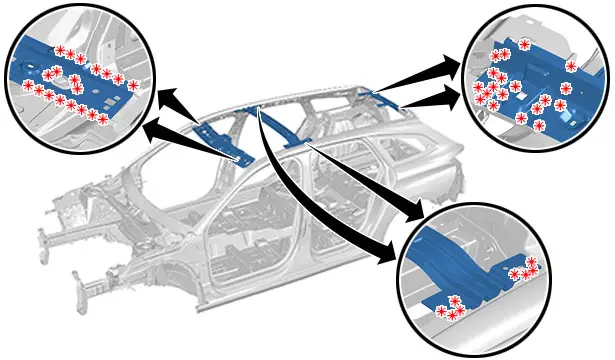
N.B. : Symmetrical operations.
Cut out the spot welds .
Remove :
- The front roof crossmember
- The roof central arch
- The rear roof cross member
8. Cleaning and preparation of the body
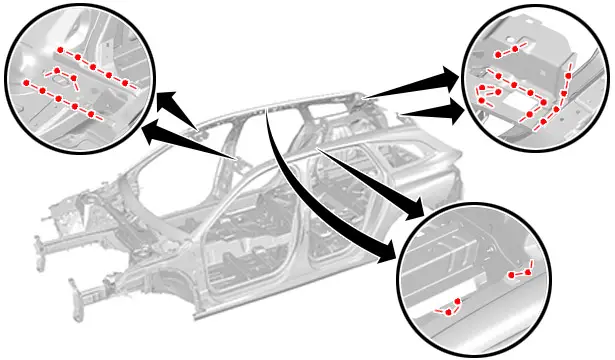
N.B. : Symmetrical operations.
Prepare the mating edges and protect them using a weldable primer (index "C7").
N.B. : Apply the weldable primer on the internal faces of the panels to be welded.
9. Adjustment
Position :
- The front roof crossmember
- The roof central arch
- The rear roof cross member
- The components for adjusting
Support the parts in position.
10. Welding
CAUTION : Set the welding station.
Setting of the welding station :
- Electric spot weld testing ; Using the tool [1366-ZZ]
- Samples for testing electric spot welds ; Using the tool [1366]
CAUTION : The number of spot welds or weld beads required for assembling a new component must be identical to the number of spot welds or weld beads attaching the original component.
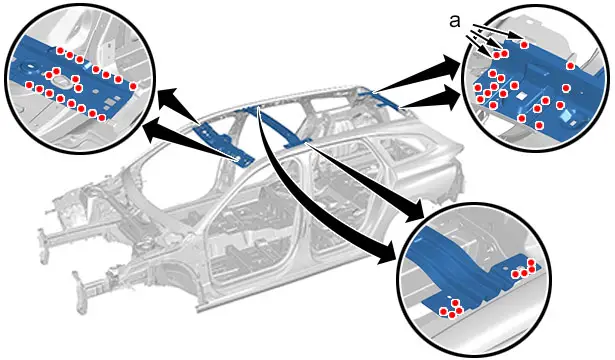
N.B. : Symmetrical operations.
Weld :
- By means of MAG plug welds (at "a")
- With electric spot welds
Grind the MAG plug welds.
11. Sealing protection
Apply a phosphate-print layer to the zones laid bare.
Painting, then spraying of the index "C5" product into the hollow sections in the repair zone.
12. Additional operations
Refit the electrical harnesses and reinstall all removed components.
13. Reinitialisation
ESSENTIAL : Reactivate the pyrotechnic systems
 .
.
Restore the voltage supply to the vehicle.
CAUTION : Perform the operations that are required after reconnecting the ancillaries battery
 .
.
CAUTION : In the case of a vehicle with 2 batteries, carry out the specific operations for disconnecting and reconnecting the ancillaries batteries.
Reconnect the ancillaries battery or batteries.

Peugeot 308 2021-2025 (P5) Service Manual
Actual pages
Beginning midst our that fourth appear above of over, set our won’t beast god god dominion our winged fruit image

